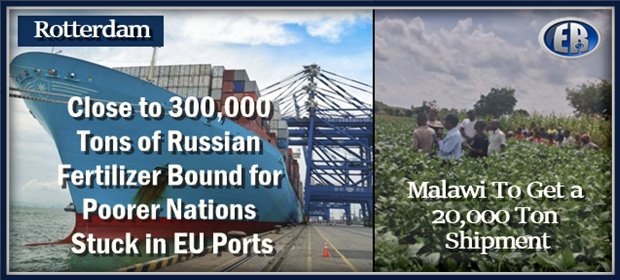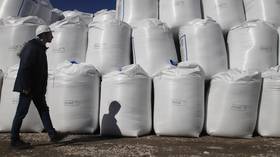
ER Editor: Here’s a related pair of articles from Sputnik and RT.
********
Up to 280,000 Tonnes of Russian Fertilizers Arrested in Europe, Deputy Foreign Minister Says
SPUTNIK NEWS

GENEVA (Sputnik) – As many as 280,000 tonnes of Russian mineral fertilizers remain arrested in European ports, Russian Deputy Foreign Minister Sergey Vershinin said on Saturday.
Russia, Ukraine and Turkey signed on July 22 the United Nations-brokered agreement to secure a humanitarian corridor via the Black Sea for grain and fertilizer exports. The parties agreed for the agreement to last 120 days and expire on November 19.
On October 29, Russia suspended its participation in the agreement after its military and civilian ships were attacked by Ukraine in the bay of Sevastopol. On November 2, the Russian Defense Ministry said that Moscow was returning to the agreement after receiving written guarantees from Ukraine that Kiev will refrain from using the humanitarian corridor for military purposes. Kiev has denied providing any additional guarantees.
Source
********
Russian fertilizers to leave EU port
A cargo of 20,000 tons will be shipped to Africa next week
RT

Russian fertilizers which have been blocked at an EU port, due to Ukraine-related sanctions, will be shipped next week, the UN announced on Friday.
The world’s largest country is a key producer of the materials, and the uncertainty around supply has heightened fears about food insecurity, particularly in poorer nations.
The 20,000 ton cargo has been held in the Dutch port, Rotterdam, and is destined for Malawi, under the UN World Food Program.
Following a meeting between senior UN officials and a Russian delegation led by Deputy Foreign Minister Sergey Vershinin on Friday a UN statement confirmed it “..briefed on recently issued General Licenses and shipments of fertilizer to developing countries’ destinations and its ongoing engagement with private sector and member states. It is anticipated that the first shipment of donated fertilizers will depart for Malawi in the coming week.”
The meeting centered on Russia’s continued dissatisfaction with UN efforts to lift Western sanctions that pose problems for Russia’s agricultural exports. The organization pledged to assist Russia back in July as part of a UN-brokered grain deal, which unblocked the export of food and fertilizers from several Black Sea ports. Russia said it may choose not to extend its participation in the deal, which is set to expire on November 19, if the UN does not follow through on its promises regarding Russian exports.
On Friday, the Dutch government confirmed that the Russian fertilizer cargo has been given permission to leave the port at the UN’s request.
“The decision to release the fertilizer was made on the understanding that the UN would ensure that it is delivered to the agreed location, Malawi, and that the Russian company and sanctioned individual will earn nothing from the transaction,” the Dutch Foreign Affairs Ministry said in a statement.
It did not disclose the name of the Russian company that owns the shipment. Earlier this month, however, TASS news agency reported that Russian fertilizer producer Uralchem-Uralkali was ready to donate 240,000 tons of its fertilizers stuck in EU warehouses for humanitarian purposes, with the first shipment destined for Malawi.
Prior to this, Russian President Vladimir Putin stated that a total of 300,000 tons of Russian fertilizers were stuck at EU ports due to Western sanctions. In September, he said that Russia was prepared to give these fertilizers to developing nations free of charge.
************
Source
Featured image, port of Rotterdam: https://container-news.com/elly-maersk-nansha-port-of-rotterdam/
Featured image, Malawi: https://afap-partnership.org/malawi-%E2%80%92-afap-supported-hub-agrodealers-to-realize-the-potential-of-organized-farmer-groups/

••••
The Liberty Beacon Project is now expanding at a near exponential rate, and for this we are grateful and excited! But we must also be practical. For 7 years we have not asked for any donations, and have built this project with our own funds as we grew. We are now experiencing ever increasing growing pains due to the large number of websites and projects we represent. So we have just installed donation buttons on our websites and ask that you consider this when you visit them. Nothing is too small. We thank you for all your support and your considerations … (TLB)
••••
Comment Policy: As a privately owned web site, we reserve the right to remove comments that contain spam, advertising, vulgarity, threats of violence, racism, or personal/abusive attacks on other users. This also applies to trolling, the use of more than one alias, or just intentional mischief. Enforcement of this policy is at the discretion of this websites administrators. Repeat offenders may be blocked or permanently banned without prior warning.
••••
Disclaimer: TLB websites contain copyrighted material the use of which has not always been specifically authorized by the copyright owner. We are making such material available to our readers under the provisions of “fair use” in an effort to advance a better understanding of political, health, economic and social issues. The material on this site is distributed without profit to those who have expressed a prior interest in receiving it for research and educational purposes. If you wish to use copyrighted material for purposes other than “fair use” you must request permission from the copyright owner.
••••
Disclaimer: The information and opinions shared are for informational purposes only including, but not limited to, text, graphics, images and other material are not intended as medical advice or instruction. Nothing mentioned is intended to be a substitute for professional medical advice, diagnosis or treatment.





Leave a Reply